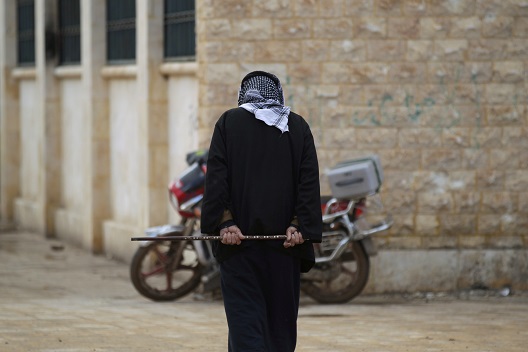 The incoming president and his national security team suffer no shortage of free advice on a full range of national security and foreign policy issues. Syria is no exception. Prospective senior officials are sipping from the proverbial fire hose preparing for January 20th. What do they need to know now, especially in the wake of a shaky ceasefire underwritten by Turkey and Russia?
The incoming president and his national security team suffer no shortage of free advice on a full range of national security and foreign policy issues. Syria is no exception. Prospective senior officials are sipping from the proverbial fire hose preparing for January 20th. What do they need to know now, especially in the wake of a shaky ceasefire underwritten by Turkey and Russia?
Job 1 in the Syrian context is determining what requires the immediate attention of President Trump. Three items come to mind:
- American forces are on the ground, in the air, and in harm’s way in central and eastern Syria, working with a largely Kurdish ground force fighting the Islamic State (ISIL, ISIS, or Daesh). The Kurds in question are the Syrian affiliate of the Kurdistan Workers’ Party (PKK), a terrorist organization operating against Turkey: a NATO ally. Defeating ISIS in Syria will be a high priority for the incoming administration. The new secretary of defense should direct an expedited strategy review so that the commander-in-chief will have options other than continuing an Obama administration approach to harassing ISIS in Syria that has been wholly unsatisfactory on multiple levels.
- The United States has supported elements of the armed Syrian opposition with the understanding that they would, in the context of a ceasefire with the Assad regime, focus their fire on ISIS and the al-Qaeda affiliate formerly calling itself the Nusra Front. Russia, Iran, and the Assad regime have tried to neutralize these American-equipped rebel units: ISIS, after all, is a useful foil for Bashar al-Assad. An early decision to continue and enhance assistance to armed opposition units willing to fight Islamist terrorists would be consistent with the incoming administration’s anti-terror priority in Syria. In no way would this support contradict efforts to sustain a ceasefire: neither the Nusra Front nor ISIS are parties to it.
- A deepening humanitarian crisis in Syria is a gift of incalculable value to Islamist extremists recruiting in Syria and internationally. The parties bearing overwhelming responsibility for this ISIS-enabling disaster are the Assad regime, Iran, and Russia. An early message from President Trump to his Russian counterpart should highlight his readiness to cooperate with Moscow in facilitating political transition in Syria while fighting ISIS. But it should also stress the inability of the United States to do so if Syrian civilians return to the bullseye of the regime and its allies.
Immediate action items aside, the incoming team must organize itself for the long haul: a requirement transcending Syria. This means establishing a foreign policy management system enabling the new president and his national security advisor to get sound policy options from the departments and agencies of government, while delegating the necessary authorities to implement presidential decisions.
Those who were selected by President Obama to serve as national security advisors were acutely aware of how the ‘interagency system’ should work, with White House staff performing a coordinating function. They had, however, no Oval Office client for a system that would have been recognizable to a Brent Scowcroft, Colin Powell, or Stephen Hadley. A president with no prior experience leading a large, complex organization had no appreciation for delegation and no aversion to micromanagement.
The new team would do well to empower its incoming secretaries of defense and state and bar national security council staffers from meddling operationally in the work of professionals. The foreign policy price paid for Oval Office micromanagement has been high and gratuitous. The process of defining policy options and executing presidential decisions should reflect a business-like appreciation for the impressive skills residing in places far beyond the “hey, you” range of the president’s voice.
Getting Syria right after years of executive branch malpractice will not be easy. What has happened in Syria has not stayed in Syria. Further damage to American credibility and Western unity can be avoided by returning to good practices abandoned by current management.
- As important as it is to reach out to adversaries to explore accommodation, allies and friends come first. The new president and his foreign policy team will have much work to do in rebuilding relationships of trust and confidence with friends and allies.
- As attractive as it is to indulge in the fantasy that the world has changed fundamentally, that ‘American leadership’ is a cliché, and that international threats and the alliances required to counter them are just oh so twentieth century, it is an indulgence to be resisted.
- As tempting as it is to check a policy box with a speech, action matters. To permit gaps to emerge between presidential word and deed is to encourage the world’s bad actors to do their worst. Proclaiming ‘red lines,’ permitting them to be crossed, and declaring the climb-down to be a source of pride is a process never to be repeated.
The Trump administration is inheriting in Syria and elsewhere bad conditions made immeasurably worse by bad White House leadership and management practices. Solving Syria will be hard. It will be impossible absent sound business practices.
Frederic C. Hof is director of the Atlantic Council’s Rafik Hariri Center for the Middle East.
Image: Photo: Ahmed al-Abdullah, 80, walks inside a school, in rebel-held Tal-Aar village, northern Aleppo province, Syria December 28, 2016. According to Ahmed, he and his extended family of 28 people fled from the Islamic State controlled al-Bab city five months ago fearing clashes in the area. Ahmed said that they currently live in a damaged school in rebel-held Tal-Aar village, near al-Rai village in northern Aleppo province. REUTERS/Khalil Ashawi
